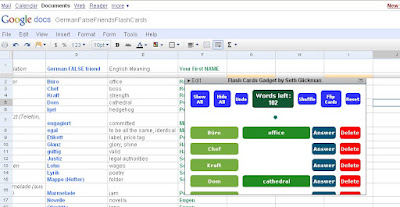C: My client in Amsterdam asked me if I use an online dictionary.
Me: Really, why? Did you ask why she asked?
C: Yes, she said sometimes I use really strange words in my emails.
Me: (laughs gently) Are you using Leo?
C: Is that a bad dictionary? Do you know a better one?
Me: Leo's good but I usually use Google Translate. Well, sometimes.
C: I should talk around the words when I don't know them. (repeating a former instruction of mine)
Me: Yeeh..es - that's a very good strategy.
C: But, sometimes that takes too long. I would prefer to know the right word.
Me: I understand.
C: I can't learn the right word if I never find it out.
Me: What about an English-English online dictionary? Like Macmillan - that's a good one, it even does pronunciation. And they have a nice blog - I must remember to feed that into our Ning.
C: But if I don't know what the word I want to say is, in English, how can I search the word I want?
Me: There is that! (laughs out loud). You could try a thesaurus?
C: That takes too long, it's the same problem with using the Leo, I still won't know the word I want.
Me: Mmm.
C: I can't know the word if I don't ever learn it.
Me: Yes. Hmm...that's why we're having these classes but I know exactly the way you feel. Sometimes when I have to deal, in German, with my taxes or do stuff to do with my business... I need an online option too.
C: Does it work for you?
Me: I don't know - no one tells me when I use strange words. But I think what your client is noticing is the old fashioned words. Leo gives you all sorts of options and that includes words that aren't wrong, they're just not... not said anymore. To be honest, I'm probably doing the same thing as you are.
I have a good German-English dictionary on my desk but these days I tend to be too lazy to look in it - it's just so big and heavy.
C: What's tend?
Me: (quiet panic, hesitation).. um, tend is like attend, like pay attention but in this context, I mean more that... I mean that usually I am too lazy or that often I am too lazy to look in my heavy dictionary.
C: It is quicker to use Leo.
Me: Hmm. Yes, you tend to use Leo when you're stuck for a word. But your client thinks it sounds strange.
C: What about if I talk around the words with you and then you tell me what the right word is?
Me: We can do that. You can also copy and paste your emails into your blog - just take out the confidential details but I can look specifically for the words that don't fit your context and I'll give you feedback on those.
C: I would like that. I can store them in my blog.
Me: Exactly. And when you have enough - I know Google Docs Spreadsheets has a really cool program - all you do is put these words in a list and we can also add the words from our Google Doc feedback sheet - then you can make a game to play at home.
C: Yes! I want to do that. You have to teach me how to make this game. Did you have a nice week? Did you finish your article yet?
Readers, have you ever been in this sort of situation?
What do you think the best way would be for me to handle C's advanced level vocabulary acquisition without really knowing what words she specifically needs to use beforehand in these emails? To be honest, I fear this (the above, waiting for the words to emerge) might actually be a really long process.
How do you handle mass-vocabulary acquisition? As you know by now, being a dogme teacher, I tend not to be too fond of presenting random lists to be learned off by heart without context... Still, I'm in a quandary - isn't there a way for me to deal with this? Do please share your top tips...
And by the way, are you pro- or anti- dictionary usage in the classroom (online or otherwise)? Why?
Useful links related to this posting:
Jason Renshaw: The best compliments are complements
Scott Thornbury: A is for Attention
Google Docs Educational Gadgets
Inside Google Translate
Internet may phase out Oxford Dictionary
Best,
Karenne















